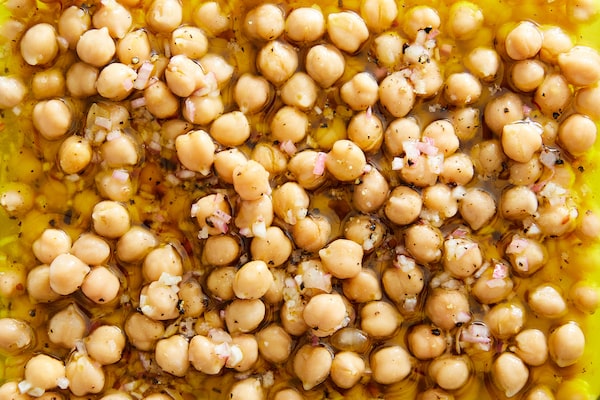Protein plays a key role in healthy aging.
The vital nutrient is needed to maintain strong bones, preserve muscle strength and physical mobility and support the immune system.
Research has also hinted that getting enough protein helps maintain cognitive function in older age.
Not all types of dietary protein are considered equal, though.

Marinated chickpeas in New York on June 6, 2023.RYAN LIEBE/The New York Times News Service
New research from Tufts University and the Harvard T.H. Chan School of Public Health gives plant protein top marks when it comes to healthy aging.
According to the findings, women who ate more plant protein in their 40s and 50s increased their odds of aging healthily. Here’s what to know.
Midlife protein intake and healthy aging
Past studies have linked higher intakes of plant protein in older age to protection against muscle loss, hip fracture and frailty.
The latest research, however, is unique in that it examined the relationship between protein consumption in midlife and indicators of healthy aging three decades later.
For the study, researchers analyzed diet and health information from 48,762 participants of the Nurses’ Health Study collected from 1984 to 2016. In 1984, women were between the ages of 38 and 59 and in good health. (The Nurses’ Health Study, established in 1976, is one of the largest investigations into risk factors for chronic diseases in women.)
Dietary data, obtained every four years, was used to calculate participants’ intakes of total protein, animal protein, dairy protein and plant protein. Protein intakes were very consistent across the 32-year follow up period.
Healthy aging, assessed in 2016, was defined as being free from 11 major chronic diseases, including type 2 diabetes, heart attack, stroke, congestive heart failure and cancer (except skin), having no impairment in memory or physical function and being in good mental health.
Participants who did not meet this healthy aging definition, or who died before 2016, were considered usual agers.
Plant protein deemed healthy aging winner
Consuming an additional 12 to 15 g of plant protein per day in midlife was associated with a 46-per-cent greater likelihood of healthy aging. Increasing plant protein further provided additional benefits.
For perspective, you’ll find 12 to 15 g of plant protein in three-quarters of a cup of lentils, 85 g of extra firm tofu, one half-cup of almonds, 12 ounces of soy milk and 1.5 cups of cooked quinoa.
On the other hand, a 12 to 15 g increase in animal protein per day (e.g., 1.5 ounces of chicken or beef) was tied to 6 per cent lower odds of aging healthily.
Protein from dairy products was not significantly associated with healthy aging.
To arrive at these finding, the researchers controlled for numerous potential risk factors including age, education, smoking status, alcohol intake, physical activity and total calorie intake.
The study was observational and therefore doesn’t prove that eating plant protein helps with healthy aging.
Even so, the study’s large sample size and very long duration add confidence to the findings.
The study population included mostly white females. It’s unknown if these associations hold up in males, ethnically-diverse populations or in groups that eat a mainly plant-based diet.
How plant protein may protect
Dietary protein stimulates muscle protein synthesis, a process that becomes blunted when older. Increasing muscle protein synthesis is associated with improved physical function in older adults. (Resistance training is the most potent stimulus of muscle protein synthesis.)
Plant protein has also been tied to favourable levels of risk factors for chronic disease, including reduced LDL cholesterol, lower blood pressure, improved insulin sensitivity and decreased inflammation.
It’s also possible that dietary components other than plant protein play a role in healthy aging. Fibre and protective phytochemicals, found in plant foods but not animal foods, may have contributed to the strong protective effects of plant protein.
Plant protein dietary swaps
To sneak more plant protein into your diet, sub out refined grains, animal protein and/or unhealthy fats for plant-based options.
Meat-free ways to boost your protein intake
For example, replace white pasta with pasta made from chickpeas, lentils, black beans or edamame. You’ll get 20 g of protein per 1.5 cups cooked.
Replace half the meat or chicken in your next stir-fry with shelled edamame, firm tofu or cashews.
Swap white rice for a higher protein whole grain such as farro, bulgur or quinoa. Each supplies 8 g of protein per one cup cooked.
Instead of spreading butter or cream cheese on your toast, try a nut or seed butter made from peanuts, almonds, cashews or pumpkin seeds. You’ll find 6 to 7 g of plant protein in two tablespoons.
Leslie Beck, a Toronto-based private practice dietitian, is director of food and nutrition at Medcan. Follow her on Twitter @LeslieBeckRD